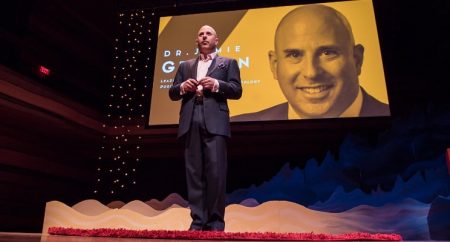
Are you feeling burned-out, tired or frustrated at work? Jamie Gruman, an organizational behaviour professor at the University of Guelph, says using your “down time” more effectively can boost your work performance and make you more productive. Through his current research, he’s developed an approach called the ReNU model, which focuses on steps to recharge your batteries while away from work, so you can return happier and more resilient.
To help mark the United Nations International Day of Happiness today (March 20), Gruman shares more on how leisure time can give us more than a break.
Q: What mistakes are many of us making when it comes to how we’re using our down time?
A: We think of down time — evenings, weekends and vacations — as a time to rest and relax. Those things are good, but not enough to overcome the feelings of being exhausted and burned out.
Q: Can you describe how the ReNU model works?
A: Think of having three buckets — one labeled “Re,” one labeled “N” and one labeled “U.” If you can fill all three during your down time, you’ll get a boost — you will have more psychological well-being, better physical health and better job performance with less effort.
The “Re” stands for rebuild. We can use our down time rebuilding the resources that become depleted when we face our weekly obligations, whether that’s being at work, caring for children or other responsibilities. To replenish those resources, you need to do something different than you would normally do. The ideal would be something that requires resources that are the opposite of what you use at work. So a surgeon who normally needs to be very precise and focused might do abstract painting on the weekend.
Q: What if you really enjoy your job and like doing similar things in your free time?
A: Even if you enjoy it, you still become depleted. Take that break and do something different and you’ll come back refreshed and performing better.
Q: What about the rest of the model?
A: The N stands for nourishing our needs. We have the basic physiological needs for food, water and sleep, but there are also psychological needs to feel competent, to have autonomy and to feel close to others. All of these are important. Lack of sleep is an epidemic right now, and it’s important to have good bedtime rituals, and to avoid checking emails or watching screens before bed to maximize rest.

Learning something new can enhance feelings of competence, and if you freely choose the activity it gives you a sense of autonomy. It can be as simple as learning to play a new chord on the guitar. Time with family and friends is also a critical part of filling that “N” bucket.
The U stands for unhook. Businesses used to be concerned about absenteeism; now I’ve coined the word “available-ism” to describe today’s serious issues. Technology means everyone is always available. If the boss sends a text at 11 p.m., you feel that you have to respond quickly or there will be negative consequences. You’re answering emails on vacation, so it’s like you’re never really away from work. This is a problem.
To unhook, you have to have some time to relax physically, but you also have to stop thinking about work in order to relax mentally. That means not being available. Many progressive companies now set limits on when people can be emailed or called — they recognize that people need this break.
Q: Is there an ideal length of time for a vacation or break from work?
A: In terms of vacations, the magic number seems to be eight days. The benefits increase for each day you are away from work, up to eight. Longer than that and you still see the benefits, but they don’t increase much after day eight.
But if you can’t do a vacation, try taking a long weekend once a month. The benefits of a break drop off after a couple of weeks, so frequent short breaks can work well. And make the most of coffee breaks, lunches, evenings and weekends. Eating lunch at your desk while you work might seem like a good idea to get things done, but you will actually be less productive.
Q: What can businesses do to help employees feel happier and more productive?
A: Many people don’t realize that paying attention to the well-being of your employees actually improves productivity and is good for business. Businesses should make it a priority, just like the company budget and project deadlines. Promoting employee development, providing coaching and support, and listening and being trustworthy are all steps that businesses can take. It’s worth the investment of a little bit of effort.